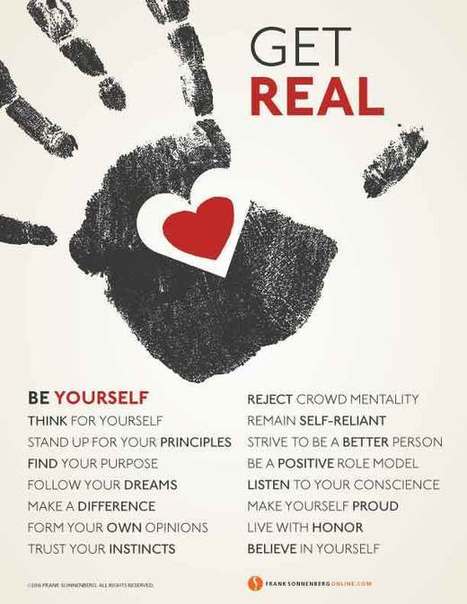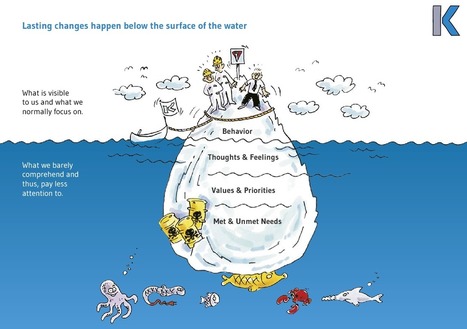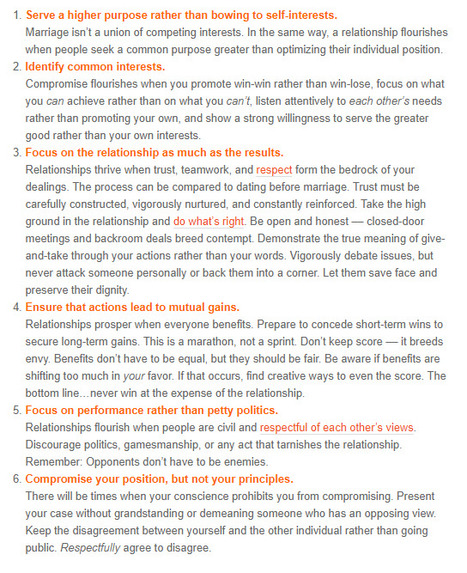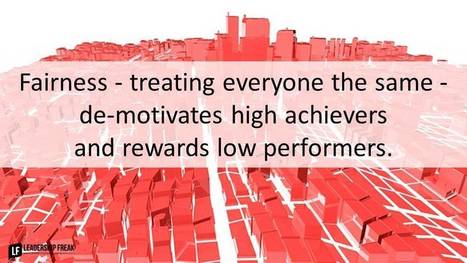 Your new post is loading...
 Your new post is loading...

|
Scooped by
Gust MEES
|
Gute Sitten ist der positive moralische Wert der Sitte. Der Begriff umfasst das Gerechtigkeits- und Anstandsgefühl aller moralisch und gerecht Denkenden (Erwachsenen) in der Gesellschaft und entspricht folglich der vorherrschenden Rechts- und Sozialmoral. Gute Sitten ist, genau wie die im Grundgesetz für die Bundesrepublik Deutschland verwendete Formulierung Sittengesetz ( Abs.

|
Scooped by
Gust MEES
|
Harassment covers a wide range of behaviors of an offensive nature. It is commonly understood as behavior that demeans, humiliates or embarrasses a person, and it is characteristically identified by its unlikelihood in terms of social and moral reasonableness. In the legal sense, these are behaviors that appear to be disturbing, upsetting or threatening.

|
Scooped by
Gust MEES
|
Eine Sitte ist eine durch moralische Werte, Regeln oder soziale Normen bedingte, in einer bestimmten Gruppe oder Gemeinschaft entstandene und für den Einzelnen verbindlich geltende Verhaltensnorm (vgl. Ferdinand Tönnies, Die Sitte, 1908). Meist beruht sie auf Tradition und Gewohnheit (= „Usus"). Eine Sitte ist jedoch mehr als Gewohnheit; denn es gibt auch als schlecht bewertete Gewohnheiten (manchmal Unsitte genannt).

|
Scooped by
Gust MEES
|
Das Sankt-Florian-Prinzip (österreichisch: Floriani-Prinzip) oder die Sankt-Florian-Politik bezeichnet Verhaltensweisen, potentielle Bedrohungen oder Gefahrenlagen nicht zu lösen, sondern auf andere zu verschieben. Die englischsprachige Entsprechung ist , ein Akronym für „Not in my backyard". Früher war es üblich, die Hilfe des Heiligen Florian anzurufen, der als Schutzpatron für die Abwendung von Feuer und Dürre zuständig ist.

|
Scooped by
Gust MEES
|
Der Duden nennt unabhängig von der psychologischen Perspektive viele sprachliche Synonyme („Eigenliebe, Eigennutz, Eigensucht, Ichbezogenheit, Narzissmus, Selbstbesessenheit, Selbstbezogenheit, Selbstliebe, Selbstsucht, Selbstverliebtheit; (gehoben) Ichsucht; (bildungssprachlich) Egotismus, Egozentrik; (Psychologie) Autophilie"). Egoismen ( Plural) sollen Handlungsweisen sein, bei denen einzig der Handelnde selbst die Handlungs maxime bestimmt.

|
Scooped by
Gust MEES
|
The word decadence, which at first meant simply "decline" in an abstract sense, is now most often used to refer to a perceived decay in standards, morals, dignity, religious faith, honor, discipline, or skill at governing among the members of the elite of a very large social structure, such as an empire or nation state.
The word decadence, which at first meant simply "decline" in an abstract sense, is now most often used to refer to a perceived decay in standards, morals, dignity, religious faith, honor, discipline, or skill at governing among the members of the elite of a very large social structure, such as an empire or nation state. By extension, it may refer to a decline in art, literature, science, technology, and work ethics, or (very loosely) to self-indulgent behavior.
Usage of the term sometimes implies moral censure, or an acceptance of the idea, met with throughout the world since ancient times, that such declines are objectively observable and that they inevitably precede the destruction of the society in question; for this reason, modern historians use it with caution. The word originated in Medieval Latin (dēcadentia), appeared in 16th-century French, and entered English soon afterwards. It bore the neutral meaning of decay, decrease, or decline until the late 19th century, when the influence of new theories of social degeneration contributed to its modern meaning.
In literature, the Decadent movement—late nineteenth century fin de siècle writers who were associated with Symbolism or the Aesthetic movement—was first given its name by hostile critics. Later it was triumphantly adopted by some of the writers themselves. The Decadents praised artifice over nature and sophistication over simplicity, defying contemporary discourses of decline by embracing subjects and styles that their critics considered morbid and over-refined. Some of these writers were influenced by the tradition of the Gothic novel and by the poetry and fiction of Edgar Allan Poe. Learn more / En savoir plus / Mehr erfahren: https://www.scoop.it/t/21st-century-learning-and-teaching/?&tag=Frank+SONNENBERG http://www.scoop.it/t/21st-century-learning-and-teaching/?&tag=Character http://www.scoop.it/t/21st-century-learning-and-teaching/?q=ethics https://www.scoop.it/t/21st-century-learning-and-teaching/?tag=Values http://www.scoop.it/t/21st-century-learning-and-teaching/?tag=Growth+Mindset

|
Scooped by
Gust MEES
|
Hubris (, from ancient Greek ) describes a personality quality of extreme or foolish pride or dangerous overconfidence, often in combination with (or synonymous with) arrogance. In its ancient Greek context, it typically describes behavior that defies the norms of behavior or challenges the gods, and which in turn brings about the downfall, or nemesis, of the perpetrator of hubris.

|
Scooped by
Gust MEES
|
Kids do crazy things, but we expect more from grown-ups, don’t we? Unfortunately, that’s not always the case. Folks scream obscenities at ballgames, bully people on social media, and treat others with total disrespect. If you think this behavior is rude, insensitive, and tasteless, you’re right. But why is it so prevalent? The truth is, some people behave this way for personal gain; some folks don’t know better; and others know they’ll get away with it — because they have in the past. Some grown-ups never grow up.
While some indiscretions were once considered outlandish, we’ve become desensitized to these actions. It’s troubling that some of this behavior could have been avoided, but too many of us didn’t speak up. Instead, we closed our eyes to the poor behavior and waited for others to make the first move. The consequence is that wrongs committed by enough people become the norm over time. We have no one to blame except ourselves.
As leaders, role models, and parents, we must utilize every opportunity to reinforce the values that we hold dear.
What Values Do You Cherish?
Are polite manners a thing of the past? Should people honor their word? Is it Pollyanna to expect people to do what’s right? I think not! But if we don’t promote good values, don’t be surprised when bad ones become the norm. “How do we improve the situation?” you ask.
First, we must modify our criterion of excellence. It’s not what you have but who you are that counts. Moral character matters! Learn more / En savoir plus / Mehr erfahren: https://www.scoop.it/t/21st-century-learning-and-teaching/?&tag=Frank+SONNENBERG http://www.scoop.it/t/21st-century-learning-and-teaching/?&tag=Character http://www.scoop.it/t/21st-century-learning-and-teaching/?q=ethics https://www.scoop.it/t/21st-century-learning-and-teaching/?tag=Values http://www.scoop.it/t/21st-century-learning-and-teaching/?tag=Growth+Mindset

|
Scooped by
Gust MEES
|
THINKING CLASSROOM PHILOSOPHY IN 4 QUESTIONS What ?
Teach learners how to think and learn Discover, value and use learners' strengths and interests
Combine the best new educational practices with the best traditional ones
Build and enrich learning relationships
Develop growth mindset characteristics and grit Why ?
Because learners need knowledge, flexible skills and grit to succeed
Because future economic & life success depends on skills and creativity
Because everyone learns in a unique way
Because education must continually prepare learners for an exciting but uncertain future
Because of Article 13a, UN Convention on the Rights of the Child How ?
By continually increasing the effectiveness of teaching
By teaching for character as well as content
By valuing each learner for what they do well
By educating for skills, character and values as well as knowledge
By preparing learners for their futures not our pasts
By valuing, supporting and resourcing all educators What if...
All learners were engaged, excited and interested in their lessons?
'School' evolved to match different lifestyles and different learning styles?
Teachers had time to enjoy their profession and real opportunities to thrive?
There was only one initiative and it was called "Learning"? Learn more / En savoir plus / Mehr erfahren: https://www.scoop.it/t/21st-century-learning-and-teaching/?&tag=Soft+Skills http://peterliljedahl.com/wp-content/uploads/Building-Thinking-Classrooms-Feb-14-20151.pdf

|
Scooped by
Gust MEES
|

|
Scooped by
Gust MEES
|

|
Scooped by
Gust MEES
|
Carlo Maria Cipolla, an economic historian, is famous for his essays about human stupidity, such as "The Basic Laws of Human Stupidity". He viewed stupid people as a group, more powerful by far than major organizations such as the Mafia and the industrial complex, which without regulations, leaders or manifesto nonetheless manages to operate to great effect and with incredible coordination.
Stupidity is a quality or state of being stupid, or an act or idea that exhibits properties of being stupid.[6] In a character study of "The Stupid Man" attributed to the Greek philosopher Theophrastus (c. 371 – c. 287 BC), stupidity was defined as "mental slowness in speech or action". The modern English word "stupid" has a broad range of application, from being slow of mind (indicating a lack of intelligence, care or reason), dullness of feeling or sensation (torpidity, senseless, insensitivity), or lacking interest or point (vexing, exasperating). It can either imply a congenital lack of capacity for reasoning, or a temporary state of daze, or slow-mindedness.
In Understanding Stupidity, James F. Welles defines stupidity this way: "The term may be used to designate a mentality which is considered to be informed, deliberate and maladaptive." Welles distinguishes stupidity from ignorance; one must know they are acting in their own worst interest. Secondly, it must be a choice, not a forced act or accident. Lastly, it requires the activity to be maladaptive, in that it is in the worst interest of the actor, and specifically done to prevent adaption to new data or existing circumstances."[7] Learn more / En savoir plus / Mehr erfahren: http://www.scoop.it/t/21st-century-learning-and-teaching/?&tag=Character http://www.scoop.it/t/21st-century-learning-and-teaching/?&tag=Growth+Mindset

|
Scooped by
Gust MEES
|
Everyone is born with the potential for greatness. What happens next is up to you. You get to choose which path you take, how high to set the bar for yourself, and how hard you’re willing to work to clear it. You get to decide how to spend your time, who to spend it with, and what you’re willing to forgo when time runs short. Every choice that you make and every action that you take has consequences, but who better to decide what’s best for you –– than you. It’s your life to live. Own it! Securing the ultimate prize takes strength and courage. You’re going to face challenges that seem insurmountable and suffer setbacks along the way, but faith, hard work, and determination will see you through. Don’t listen to naysayers or allow others to lead you astray; follow your heart and let your dreams lead the way. You owe it to yourself to be the best you can be. You’ll travel this road only once. Believe in yourself and make yourself proud. There are no dress rehearsals in life. Learn more / En savoir plus / Mehr erfahren: http://www.scoop.it/t/21st-century-learning-and-teaching/?&tag=Character http://www.scoop.it/t/21st-century-learning-and-teaching/?&tag=Frank+SONNENBERG
|

|
Scooped by
Gust MEES
|
Sur les autres projets Wikimedia : Les bonnes mœurs sont les habitudes, les usages conformes à la moralité, à la religion et à la culture d'un pays ou d'un peuple. Elles constituent un ensemble de normes, le plus souvent coutumières, en partie formulées dans les traités de civilité et dans les règles de droit civil et pénal.
Les bonnes mœurs sont les habitudes, les usages conformes à la moralité, à la religion et à la culture d'un pays ou d'un peuple. Elles constituent un ensemble de normes, le plus souvent coutumières, en partie formulées dans les traités de civilité et dans les règles de droit civil et pénal. Elles varient selon les peuples et les époques, et constituent l'un des objets d'étude de l'ethnologie et de la sociologie historique.
La notion de bonnes mœurs porte essentiellement sur la vie privée et sur son respect, elle est le contrepoint de celle d'ordre public.
Les bonnes mœurs renvoient de nos jours principalement aux sexualités : pornographie, inceste, polygamie, prostitution, proxénétisme, pudeur, etc. Learn more / En savoir plus / Mehr erfahren: https://www.scoop.it/topic/21st-century-learning-and-teaching/?&tag=Civilit%C3%A9 https://www.scoop.it/topic/21st-century-learning-and-teaching/?&tag=civility http://www.scoop.it/t/21st-century-learning-and-teaching/?&tag=Empathy https://www.scoop.it/topic/21st-century-learning-and-teaching/?&tag=DQ http://www.scoop.it/t/21st-century-learning-and-teaching/?tag=Empathy http://www.scoop.it/t/21st-century-learning-and-teaching/?tag=Soft+Skills

|
Scooped by
Gust MEES
|
Dieser Artikel oder Abschnitt bedarf einer Überarbeitung. Näheres sollte auf der Bitte hilf mit, ihn zu Diskussionsseite angegeben sein. verbessern, und entferne anschließend diese Markierung. In diesem Artikel oder Abschnitt fehlen noch folgende wichtige Informationen: Es fehlt die Begriffsgeschichte. Die fängt mit den alten Griechen und Augustinus („caritas") an und führt über einen Riesenbogen bis in die Gegenwart.

|
Scooped by
Gust MEES
|
Nimby steht als englischsprachiges Akronym für Not in my backyard („Nicht in meinem Hinterhof", „Nicht in meinem Bereich"). Der entsprechende deutsche Ausdruck lautet Sankt-Florians-Prinzip. Es steht für eine ethische und politische Position, die darauf bedacht ist, Probleme nicht im unmittelbaren Umfeld zu ertragen.

|
Scooped by
Gust MEES
|
Umgangsformen sind Formen sozialer Interaktion. Eine Gesellschaft bewertet bestimmte Verhaltensformen negativ (z. B. als derb, roh, ungehobelt, unhöflich, ungesittet, feige) oder positiv (z. B. als gut erzogen, höflich, kultiviert, edel, tapfer) und unterscheidet „gute" und „schlechte" Umgangsformen. Häufig verwendet man in der deutschen Sprache das Wort „Umgangsformen" ohne den Zusatz „gut" und meint gleichwohl „gute Umgangsformen".

|
Scooped by
Gust MEES
|

|
Scooped by
Gust MEES
|
Dekadenz (von lateinisch „fallen", „sinken", französisch „Niedergang", „Verfall", über mittellateinisch decadentia) ist ein ursprünglich geschichtsphilosophischer Begriff, mit dem Veränderungen in Gesellschaften und Kulturen als Verfall, Niedergang beziehungsweise Verkommenheit gedeutet und kritisiert wurden. Er wurde in der französischen Historiographie zuerst für den Niedergang Roms gezielt verwendet. Die Kritik am Dekadenten emanzipiert sich vom hergebrachten religiösen Moralisieren.

|
Scooped by
Gust MEES
|
Behavior changes in people doesn't just happen from one day to the next. Changes in this area takes time - and often, the motto: "You can´t teach an old dog new tricks" applies. Nevertheless - the situation is not hopeless and people are capable of change and are often willing to do so. You are likely to achieve the desired success, if you consider the following four "change levers":
Attitude & Motivation
Knowledge & Skills
Structures & Processes
Role Models & Culture
Learn more / En savoir plus / Mehr erfahren: https://www.scoop.it/t/21st-century-learning-and-teaching/?&tag=change

|
Scooped by
Gust MEES
|
When we were growing up, our teachers saluted great individuals who changed the course of history; during dinnertime, our parents lovingly recalled their idols; and of course, we had our own personal heroes who walked on water. They were wonderful role models.
Martin Luther King, Princess Diana, Leonard Bernstein, Walter Cronkite, Colin Powell, Helen Keller, Ronald Reagan, Bill Gates, John Kennedy, Vince Lombardi, Steve Jobs, the Beatles, Tim Russert, John Glenn, Mother Teresa . . . to name a few.
There was something about these role models that made them special. They led by example, raised the bar for us, and were simply the best of the best. We might have even wanted to be them, someday.
We looked up to them, and to other role models, because of their accomplishments, such as overcoming obstacles to achieve greatness, speaking up when no one else would, living rags-to-riches stories, being poster children for honesty and integrity, putting others’ needs ahead of their own, and fighting tirelessly for causes they believed in. Many of these role models changed our world . . . forever.
I know it’s a generality, but would you be proud if your kids followed in the footsteps of many of today’s politicians, professional athletes, Hollywood celebrities, or pop musicians? There’s no need to mention them by name. You know who I’m talking about. Sure, there are some wonderful role models to celebrate, but too many of today’s public figures are train wrecks –– purveyors of greed, recklessness, or dishonesty. Too often they’re excused for drug and alcohol abuse, marital infidelity, and personal arrogance as we sit mesmerized by their fame. Need I say more?
I’m not suggesting that role models have to be saints, but let’s get real. Many executives can’t tell the difference between right and wrong until they’re caught, many politicians appear to treat integrity as a liability, and celebrities live so close to the edge that many are in danger of falling off. Shame? Disgust? Public outrage? Nope. . . Too many journalists are no longer interested in reporting the facts; they’re more concerned with ratings, shaping the news, or giving cover to those who subscribe to their personal views. Obviously, there’s a void that needs to be filled. Learn more / En savoir plus / Mehr erfahren: https://www.scoop.it/t/21st-century-learning-and-teaching/?&tag=LeaderShip https://www.scoop.it/t/21st-century-learning-and-teaching/?&tag=Frank+SONNENBERG

|
Scooped by
Gust MEES
|
“But we’ve always done it that way” is the comfortable, regular, and normal barrier to enacting change. And, our reluctance to change — in our personal and our professional lives — not only limits progress, it also prizes old ways of doing and being that, by design, were exclusive. When we rely on the ways we have always done it, likely we are also relying on our past efforts, and history on many fronts tells us that our past efforts weren’t the most inclusive or equitable. Learn more / En savoir plus / Mehr erfahren: https://gustmees.wordpress.com/2017/06/02/still-following-we-have-always-done-it-this-way-or-already-on-growth-mindset/

|
Scooped by
Gust MEES
|

|
Scooped by
Gust MEES
|
If you define winning as getting the upper hand, backing your opponent into a corner, and winning at any expense, you’ve got it all wrong. You may win in the short term, but think about the relationship going forward. Do those actions build trust, teamwork, and respect? I think not. You’ve probably created enough animosity, distrust, and jealousy to last a lifetime. In other words, you may have won the battle, but lost the war. There’s a better way…winning doesn’t have to be at someone’s expense.
Compromise: A Win-Win Strategy
Some people need to win at all costs because their ego won’t accept anything less. They’d rather win personally than accomplish something meaningful. Compromise isn’t a synonym for surrender; it’s a winning battle plan. Learn more / En savoir plus / Mehr erfahren: http://www.scoop.it/t/21st-century-learning-and-teaching/?&tag=Win-Win-Situation http://www.scoop.it/t/21st-century-learning-and-teaching/?&tag=Frank+SONNENBERG

|
Scooped by
Gust MEES
|
Bigger issues: #1. Unfairness is necessary. Giving second chances, for example, isn’t fair to those who perform on schedule and within expectation. But, not giving second chances is cruel. #2. Fairness is merciless. Mercy is not getting what you deserve. In other words, mercy isn’t fair. #3. Equal opportunity must include reward or lack of reward. Those who seize opportunities earn reward. Those who don’t seize opportunities don’t earn reward. It’s important to note that it’s not necessary to punish those who don’t seize opportunity. Rewarding teams always includes some unfairness.
#4. Fairness – treating everyone the same – de-motivates high achievers and rewards low performers. #5. Fairness, when it means everyone is treated the same, promotes inaction. If you can’t be do something for everyone then you can’t do it for anyone. The result is you don’t do much. Learn more / En savoir plus / Mehr erfahren: http://www.scoop.it/t/21st-century-learning-and-teaching/?&tag=Counterfeit+Leadership http://www.scoop.it/t/21st-century-learning-and-teaching/?&tag=Growth+Mindset
|



 Your new post is loading...
Your new post is loading...

































Gute Sitten ist der positive moralische Wert der Sitte. Der Begriff umfasst das Gerechtigkeits- und Anstandsgefühl aller moralisch und gerecht Denkenden (Erwachsenen) in der Gesellschaft und entspricht folglich der vorherrschenden Rechts- und Sozialmoral.
Learn more / En savoir plus / Mehr erfahren:
https://www.scoop.it/topic/21st-century-learning-and-teaching/?&tag=Civilit%C3%A9
https://www.scoop.it/topic/21st-century-learning-and-teaching/?&tag=civility
http://www.scoop.it/t/21st-century-learning-and-teaching/?&tag=Empathy
https://www.scoop.it/topic/21st-century-learning-and-teaching/?&tag=DQ
http://www.scoop.it/t/21st-century-learning-and-teaching/?tag=Empathy
http://www.scoop.it/t/21st-century-learning-and-teaching/?tag=Soft+Skills
http://www.scoop.it/t/21st-century-learning-and-teaching/?tag=Daniel-GOLEMAN
http://www.scoop.it/t/21st-century-learning-and-teaching/?tag=Emotional-Intelligence
http://www.scoop.it/t/21st-century-learning-and-teaching/?tag=EQ
https://www.scoop.it/t/21st-century-learning-and-teaching/?&tag=Frank+SONNENBERG